


The truth as seen from my perspective is that, yes we have fought for democracy and proper governance these past 50 years, but we have in the process lost our sense of individual responsibility towards the welfare of other individuals within our communities. We are sure to be seen as a bunch of pretenders if we enjoy the festivities of the 50 th independence anniversary but forget to map the way forward toward the first century of independence. We can never sing of peace, rain, and prosperity when our silos are empty due to recent droughts, when there is no rain in the skies of the Kingdom in the Sky, when prosperity is only visible on the national coat of arms, and hordes of unemployed educated and uneducated roam the streets. When the wealth of one is at the expense of many it is outright wrong, and when the gap between the rich and the poor becomes an abyss, it is a travesty that should be done away with on the 4 th of this October for we can never claim to be the most peaceful nation in the world with bellies growling in hunger. That is just the way it is, unless one wants to play the ostrich with his head buried in the sand. The old faithful spirit of communalism that got this country and nation where it is today is no longer in vogue individualism is the key term in fashion. The hecklers will just cackle, “you can never change the world…”, or give the dispirited statement once sung in a beautiful Bruce Hornsby song, “that’s just the way it is…” things are just what they are, and so, if you try and adopt that old spirit of sharing and caring for everyone, you are bound to be left behind by time and progress because a larger part of the modern generation is bent on grabbing whatever is in sight for their own private self-enrichment. Being communal in outlook and behaviour is instead of being venerated frowned upon, and whoever sets out to be sharing and considerate of the needs of others is looked upon as a fool. The dearth of the old spirit of communalism (as found in the concepts of Letsema and Ubuntu) has largely contributed to the demise of these two virtues due to the way children are taught in primary, intermediate and tertiary schools. I look to the way we are socialised as individuals in our society and, drawing from the early years in school, one issue stands out we are taught to compete for meagre resources by the educational system in place. We should start from the level of the individual, to the level of community, and then to the level of the state and the nation when we analyse the extent of our progress, and the level of our change.īeing roundabout when we should confront issues pertaining to progress and change head on will not get us anywhere as a nation, and I believe, avoiding a problem still in its infancy will just give it time to grow into a monster we will not be able to deal with in a few score years. The question this week is: How far have we changed and progressed as a country since October the 4 th 1966?īeing frank never killed anyone, unless such one is surrounded by delusional individuals that find honest truth uncomfortable, and I believe we should be blatantly frank when it comes to incising the issues of progress and change. The Roman Empire, however, still influences the way the politics of this world are run, the legal systems of the day still adopt its models, and it can therefore be used as a background when one needs to gauge their levels of progress and change as a country. At the end of the day, the most civilised empire in the history of time became a model of regress and decay, and though it lasted over 423 years it fell due to malaises it created itself.

Many of the Roman citizens were doomed into serfdom, a lot perished in the rebellions that were savagely stamped out by the armies bearing their scuta, gladiola, and spiked clubs. Ruled by Caesars (the most famous being Gaius Julius Caesar Octavianus who established the Roman Empire in 27 BC), classical or Ancient Rome was a successful empire at its height, but it soon fell into debauchery marked by endless revelling, internal conflicts for positions of power in politics, increased poverty levels in the plebeian masses, and general increase in greed levels amongst the nobles for land and property.

It is said that at its height, the Roman Empire was vast, stretching all the way from the northern tip of England, to the northern regions of Africa, and parts of middle-eastern Asia.


 0 kommentar(er)
0 kommentar(er)
